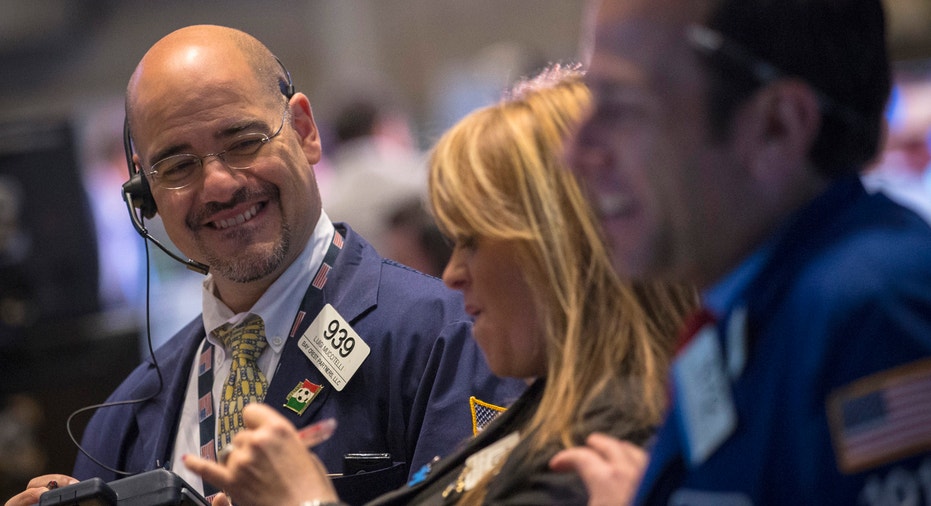Dow Snaps Seven Days of Loses, Fischer's Inflation Skepticism Sends Stocks Surging

U.S. equity markets rallied into the close of trade after surging Monday on comments from the Fed’s No. 2 official that inflation continues to run below the central bank’s 2% objective.
The Dow Jones Industrial Average jumped 241 points, or 1.39% to 17615. The S&P 500 gained 26 points, or 1.28% to 2104, while the Nasdaq Composite rose 58 points, or 1.16% to 5101.
Today’s Markets
There was no data set for release on Monday in the U.S., but that didn’t stop economic news from driving the market’s action. On Bloomberg TV, Federal Reserve Vice Chairman Stanley Fischer said the labor market has reached “nearly full employment” but with “very low inflation.”
While he didn’t predict when the central bank is most likely to hike rates, he did say “the concern about the situation is not to move before we see inflation as well as employment returning to more normal levels.”
Traders took that as a sign the Fed could wait to move on rates until after its September meeting, which led the Dow to break seven-straight sessions of losses.
“The reality for us here is we’re getting close to the Fed being able to lift rates, and we’re at a point where they need to start doing something because the excuse for not doing anything at all is getting really, really weak,” Jason Pride, director of investment strategy at Glenmede said. “We’re of the opinion that the Fed thinks of monetary policy as an insurance mindset meaning they worry about what the biggest risk is and err on the side of protecting that.”
He added the markets are likely to be satiated if the Fed communicates a slow rate hike pattern.
“My personal belief is a September or December hike, but we’re splitting hairs over the timing. What matters is the slope of the increase,” Pride said.
It’s a mixed message for Wall Street after another solid month of job creation in America. The U.S. economy added 215,000 jobs in July, slightly lower than the 223,000 anticipated, while the unemployment and labor force participation rates remained unchanged for the month.
Meanwhile, second-quarter earnings season continued to near an end. Sysco (NYSE:SYY) profit took a hit after the company terminated its plan to acquire rival US Foods. A slew of names were due out after the close of trade including Shake Shack (NYSE:SHAK) and Hertz (NYSE:HTZ). Kraft Heinz (NYSE:KHC) was also set to report after the bell, its first quarterly report card since the merger between the two companies closed last month.
Elsewhere in corporate news, billionaire investor Warren Buffett’s Berkshire Hathaway (NYSE:BRK) announced it plans for its biggest deal yet: The acquisition of Precision Castparts (NYSE:PCP), an aircraft components maker for $235 a share – a 21.2% premium to Precision’s Friday close.
On the commodities front, crude oil prices were higher to kick off the week, but remained under pressure as a result of the persisting supply glut. U.S. crude settled 2.48% higher to $44.96 a barrel, after losing 6.90% last week. Meanwhile, Brent, the international benchmark, rose 3.70% to $50.41 a barrel.
The energy sector rallied most on Monday, jumping 3.11% as investors become more optimistic the selloff in crude has hit its bottom. All 40 energy stocks in the S&P 500 were higher.
The metals market followed suit. Gold traded up 0.92% to $1,104 a troy ounce, while copper paced 2.77% higher to $2.40 a pound, after hitting a new six-year low on Friday.
“It’s hard for me to argue that sentiment is overwhelmingly against commodities and energy when the cover story from [Barron’s says it’s time to buy commodities],” Michael Block, chief strategist at Rhino Trading Partners wrote in a note. “Be patient and really jump in only when there’s blood in the streets. I see no blood just yet.”
In currencies, the euro rose 0.57% against the U.S. dollar. The yield on the benchmark 10-year U.S. Treasury rose 0.57 of a percentage point to 2.232%.
Across the world, the Shanghai Composite index jumped 4.92 %, while Hong Kong’s Hang Seng dipped 0.13%, and Japan’s Nikkei ticked 0.41% higher.
The moves in Asia come as Chinese authorities continue to support the market. Meanwhile, producer prices in the nation fell 5.4% in July from the same period the year prior, the biggest drop in six years. In Japan, a consumer confidence gauge fell in June.
Over in Europe, focus returned to Greece where a stock-market selloff continues with ten days for the nation to make its next debt payment. The Euro Stoxx 50, which tracks large-cap companies in the eurozone, rose 1.02%. The German Dax rose 0.99%, the French CAC 40 fell 0.79%, while the UK’s FTSE 100 ticked 0.26% lower.



















